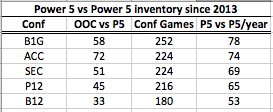Same ole BS in the ACC. Screw the football schools and then demand them to be elite or blame them for ACC weakness. Same ole same ole.
David Hale
Does the ACC need a 9-game conf schedule to build inventory? Since 2013, only the Big Ten has had more P5 vs P5 games...pic.twitter.com/vuvZJ2x7iW

David Hale
9-game ACC sched would mean FSU, Clem, Lou, GT see other div teams more often but virtually eliminates seeing OOC P5 teams other than rival.
David Hale
Absolutely, and shouldn't be understated. But for FSU, GT, Clem, Lou, it limits opp to schedule other games.https://twitter.com/ralphDrussoAP/status/782994937579044864 …
David Hale
Yes. But that's saying some ACC teams need to play 11 P5 opp to have a big non-traditional OOC game, which is big comp disadvantage vs SEC.https://twitter.com/jayrevell/status/782996215541731329 …
http://www.dailypress.com/sports/teel-blog/
Men’s basketball is bumping the league schedule from 18 to 20 games, effective in 2019-20. ESPN gave football more flexibility, presenting two options, one of which will be implemented in 2019:
# Expand the conference schedule to nine games and retain the current mandate for each team to play at least one non-conference opponent from a Power Five league. Call this the 9+1 model.
# Remain at eight games, but require each school to play at least two non-conference contests every season against teams from Power Five leagues. Call this 8+2.
And there’s the rub. ACC athletic directors voted 8-6 in 2014 to remain at eight league games and require all teams to play at least one Power Five non-conference game – Virginia Tech’s Whit Babcock sided with the majority, Virginia’s Craig Littlepage with the minority.
With ACC membership now at 14, that decision translated to playing six of your league colleagues once every six seasons, once every 12 at home, a farcical frequency for purported conference “rivals.” But to preserve non-league scheduling flexibility and to avoid five conference road games every other season, that’s how the slim majority voted.
Mandating a second Power Five non-league contest alters the dynamics markedly.
For ACC schools with an annual non-conference Power Five rival – Clemson vs. South Carolina, Florida State vs. Florida, Georgia Tech vs. Georgia, Louisville vs. Kentucky – 8+2 borders on business as usual. But for the others, finding two Power Fives for each season figures to be exhausting, if not impossible, prompting several athletic directors, Babcock included, to rethink their position.
The Big Ten, Big 12 and Pacific 12 already play nine league contests, curbing their availability for non-conference dates. The Southeastern Conference plays eight league games, but those programs already are frequent opponents for the ACC, and they aren’t lining up for more encounters versus the ACC.
Big 12 presidents are mired in a perpetual expansion debate, and some ACC athletic directors would like to delay their scheduling vote until the Big 12 resolves its future, perhaps later this month. The theory there is that a larger Big 12 would grow the pool of potential Power Five opponents.
But waiting on America’s most dysfunctional conference, the Big 12, is no way for the ACC to conduct business. Besides, two more Big 12 teams wouldn’t make ACC non-league scheduling that much easier.
Soon after the ACC in 2011 invited Syracuse and Pittsburgh to join the league, the ADs approved a nine-game conference schedule. But that was quickly scrapped when Notre Dame became a partial ACC member and agreed to play, on average, five football games each season against rotating league opponents.
So yes, the Fighting Irish complicate matters. But they bring far more assets than liabilities, and without their national appeal and overall excellence, ESPN might not have created the ACC Network.
Playing Notre Dame every few years in football certainly complicates scheduling for the four ACC schools with annual SEC rivals, especially Clemson, which is determined to play seven home games every season.
Clemson, Florida State and Louisville’s national prominence notwithstanding, their concerns may not override the scheduling issues most would face in the 8+2 model. And they certainly don’t override the infrequency of which far too many ACC teams play one another.
If ESPN expanded the Power Five pool to include the American Athletic Conference, 8+2 would become far more palatable and likely prevail. If not, momentum is building for 9+1 as the ADs prepare for what promises to be an animated debate that could change minds.
Here’s a breakdown:
Clemson, Florida State, Louisville, Georgia Tech and Duke appear to staunchly prefer 8+2. That’s five of the seven votes this option needs -- a 7-all deadlock means the ACC remains at eight conference games and adds the second required Power Five contest. Commissioner John Swofford does not become Vice President Biden in the Senate and break the tie.
Miami, North Carolina, Virginia, North Carolina State, Wake Forest and Boston College are likely committed to 9+1. That’s six of the eight votes required.
That leaves Virginia Tech’s Babcock, Pitt’s Scott Barnes and Syracuse’s John Wildhack, the latter two new to the conference since the 2014 vote. None has publicly revealed a preference, but Babcock and Barnes seem to be leaning toward 9+1, and if that's where they land, change for the better is coming to ACC football.
Clemson, Florida State, Louisville, Georgia Tech and Duke appear to staunchly prefer 8+2. That’s five of the seven votes this option needs -- a 7-all deadlock means the ACC remains at eight conference games and adds the second required Power Five contest. Commissioner John Swofford does not become Vice President Biden in the Senate and break the tie.
That leaves Virginia Tech’s Babcock, Pitt’s Scott Barnes and Syracuse’s John Wildhack, the latter two new to the conference since the 2014 vote. None has publicly revealed a preference, but Babcock and Barnes seem to be leaning toward 9+1, and if that's where they land, change for the better is coming to ACC football.
Teel is a human centipede-level bitch.
ReplyDelete